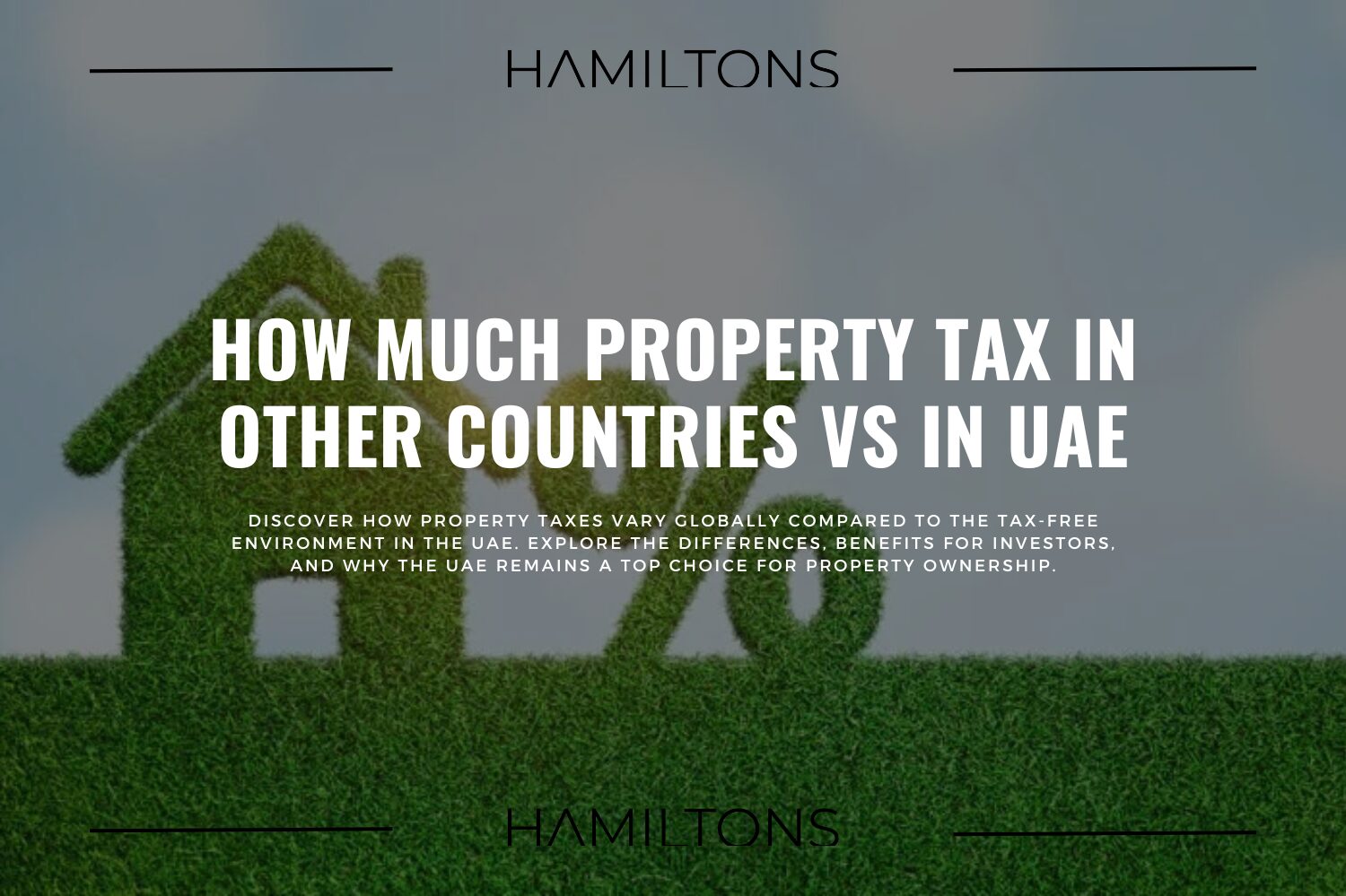Property tax is a common feature in most countries, and it is crucial in generating government revenue. However, when you compare property tax rates globally, you’ll find significant differences from country to country.
Some nations rely heavily on property taxes to fund public services, while others, such as the UAE, offer more favorable conditions for property owners by having little to no property tax.
But what does this really mean for property investors? Let’s dive into how much property tax varies globally and why the UAE stands out.
The UAE, unlike many other countries, does not impose a traditional property tax. Instead, property owners typically pay fees associated with the purchase, ownership, and transfer of property. These fees can vary depending on the emirate, but generally include:
Transfer fees: Paid when buying or selling a property. Dubai Land Department, Transfer of registration fees from one property to another application.
Registration fees: Paid when registering a property. Dubai Land Department – Registration of the sale of a mortgaged property (registering a property for sale) application.
Municipal fees: Charged based on the rental value of the property. Everything You Need to Know About the Dubai Municipality Housing Fee.
In contrast, many countries around the world have a property tax system. This involves a regular payment based on the assessed value of the property. The rate of property tax can vary widely depending on factors such as location, property type, and local government policies.
” Latest report, which examined 15 cities across the world, found that Dubai had the second-lowest rate of property fees (which it compared to other property taxes, as it has been mentioned before that Dubai does not have a property tax), equating to 3.6% over a period of five years, with only Monaco preceding it at 3.5%. The rank comes despite Dubai Land Department increasing the transfer fee to 4% of the property value. “
Here are some examples of property tax rates in other countries:
United States: Property tax rates can vary significantly from state to state and even within a state. However, it’s not uncommon for rates to range from 0.5% to 2% of the assessed property value.
United Kingdom: Council tax is a form of property tax in the UK. The amount paid depends on the property’s band, which is based on its value.
Canada: Property taxes in Canada are levied by municipalities and can vary widely across different provinces and cities.
Australia: Property taxes, known as council rates, are typically calculated based on the property’s land value.
It’s important to note that property tax laws and regulations can change over time. It’s always advisable to consult with a local tax professional for the most accurate and up-to-date information.
Understanding Property Tax
What is Property Tax?
Property tax is a levy placed by governments on real estate, including residential and commercial properties. This tax is typically calculated as a percentage of the property’s assessed value, and it is paid annually by property owners.
How is Property Tax Calculated?
The calculation of property tax depends on the assessed value of the property, which may vary based on local government policies, market conditions, and location. Many factors, such as property improvements and local tax rates, influence the final tax amount.
Property Tax in the UAE
Overview of the UAE’s Tax Policies
Unlike many countries, the UAE does not impose a formal property tax. This is one of the reasons the nation is seen as a tax haven for investors, particularly in real estate.
Exemption from Property Tax in the UAE
Property buyers and owners in the UAE enjoy significant financial advantages because there is no property tax on residential properties. This tax-free policy attracts foreign investors, making the UAE’s real estate market a global hotspot.
Countries with the Highest Property Taxes
Property taxes vary significantly across countries due to factors such as economic conditions, government policies, and property values. Here are some countries that are generally known for having relatively high property taxes:
European Countries
- Belgium: Often cited as having some of the highest property taxes in Europe.
- France: Known for its high property taxes, particularly in urban areas.
- Germany: Property taxes in Germany can be substantial, especially in major cities.
- Luxembourg: Despite its small size, Luxembourg has relatively high property taxes.
- Sweden: Property taxes in Sweden are generally higher than in many other European countries.
Other Countries
- United Kingdom: Council tax, a form of property tax, can be significant in certain areas.
- Canada: Property taxes vary widely across provinces and cities but can be high in some regions.
- Australia: Council rates, the equivalent of property taxes, can be substantial in certain areas.
- New Zealand: Property taxes, known as rates, are generally higher than in many other countries.
Important Notes:
Local Variations: Property tax rates can vary significantly within a country, depending on factors such as location, property type, and local government policies.
Tax Reforms: Property tax laws and regulations can change over time, so it’s important to consult with local experts for the most up-to-date information.
Other Property Costs: In addition to property taxes, there may be other property-related costs to consider, such as transfer taxes, registration fees, and maintenance expenses.
United States
In the U.S., property taxes vary by state and municipality, but they can reach as high as 2.5% of a property’s assessed value annually. For example, New Jersey is known for having some of the highest property tax rates in the country.
Canada
Canadian property taxes also differ by province. In cities like Toronto and Vancouver, homeowners pay between 0.5% to 1% of the assessed property value annually, which contributes to funding local services.
United Kingdom
In the UK, council tax is paid by homeowners and is based on the value of the property. It ranges from around 0.5% to 1.5%, depending on the property’s location and local authority.
Countries with the Lowest Property Taxes
While many countries have relatively high property taxes, there are also several nations with lower rates.
Here are some examples:
European Countries
- Malta: Known for its low property taxes, making it attractive to property investors.
- Cyprus: Offers competitive property tax rates, particularly for non-residents.
- Bulgaria: Property taxes in Bulgaria are generally lower than in many other European countries.
- Portugal: Has implemented various tax incentives to attract foreign investors, including reduced property taxes.
Singapore
Singapore has low property taxes, with a progressive tax rate that begins at 0% for owner-occupied residential properties and increases only slightly for rental properties.
Hong Kong
Hong Kong’s property tax regime is also lenient, with a rate of approximately 5-15% on rental income, rather than a direct tax on the property value.
Switzerland
Switzerland is another country with relatively low property taxes. The tax rates differ by canton but typically range between 0.2% and 0.5% of the property value.
How Property Tax Affects Property Ownership
Influence on Real Estate Investment
High property taxes can deter investors, especially in countries like the U.S. and Canada. On the other hand, the absence of property tax in the UAE attracts international buyers and real estate developers.
Impact on Rental Prices
In countries with high property taxes, landlords often pass on the additional cost to tenants through higher rental prices. In contrast, rental costs in the UAE remain more competitive due to the absence of property taxes.
Comparison: UAE vs Other Countries
UAE’s Unique Tax System
The UAE’s decision to not impose property tax stands in stark contrast to the tax regimes of countries like the U.S. and the UK. This tax-free structure is especially appealing to those seeking to minimize tax liabilities.
Advantages for Foreign Investors
Foreign investors in the UAE benefit from minimal taxation, which maximizes returns on investment. This is one of the primary reasons Dubai and Abu Dhabi have seen an influx of real estate purchases.
Why the UAE is an Attractive Property Market
The UAE, particularly Dubai, has emerged as a global real estate hub, attracting investors from around the world. Here are some of the key factors that make the UAE’s property market so attractive:
Strong Economic Growth
- Diversified Economy: The UAE has a diversified economy that is not heavily reliant on oil and gas. This has contributed to its economic stability and growth.
- Government Initiatives: The UAE government has implemented various initiatives to promote economic development and attract foreign investment.
Stable Political Environment
- Safe and Secure: The UAE is known for its safe and secure environment, which is a major factor for investors considering property purchases.
- Political Stability: The country has a stable political system, providing a favorable environment for long-term investments.
World-Class Infrastructure
- Modern Facilities: The UAE boasts world-class infrastructure, including modern transportation systems, high-quality healthcare facilities, and top-notch educational institutions.
- Urban Development: The country has witnessed rapid urbanization, with the development of numerous iconic landmarks and residential communities.
High Return on Investment (ROI)
- Capital Appreciation: Property values in the UAE have historically shown strong capital appreciation, making it a lucrative investment option.
- Rental Yields: The rental market in the UAE is robust, offering attractive rental yields for property investors.
Tax-Friendly Environment
- No Property Taxes: The UAE does not impose a traditional property tax, making it a more cost-effective option compared to many other countries.
- Corporate Tax Benefits: The UAE offers favorable corporate tax rates, attracting businesses and investors.
Lifestyle and Quality of Life
- International Lifestyle: The UAE offers a cosmopolitan lifestyle with a diverse population and a wide range of cultural and leisure activities.
- High Standards of Living: The country boasts high standards of living, including excellent healthcare, education, and recreational facilities.
Visa and Residency Options
- Investor Visas: The UAE offers various investor visa programs that allow foreign investors to obtain residency permits and enjoy the benefits of living and working in the country.
These factors, combined with the UAE’s strategic location and strong international connectivity, have made it a highly desirable property market for both local and foreign investors.
Tax-Free Benefits
For property owners, the lack of tax on real estate holdings means that every penny of profit from a property’s appreciation or rental income is retained. This is a rare benefit in today’s global economy.
Government Incentives for Investors
In addition to tax exemptions, the UAE government offers various incentives to encourage property investment, including long-term visas for investors.
Other Types of Taxes on Properties in the UAE
VAT on Commercial Properties
While residential properties are exempt from property taxes, commercial properties in the UAE are subject to Value Added Tax (VAT), currently set at 5%.
Municipality Fees
Property owners in the UAE do pay a municipality fee, which is much lower than traditional property taxes, making it easier for residents to own real estate.
Impact of Property Taxes on Expats
Expats in the UAE
For expats in the UAE, the absence of property taxes significantly reduces the cost of living and encourages property ownership.
Expats in High-Tax Countries
In countries with higher property taxes, such as the U.S. and Canada, expats often face higher costs when investing in real estate compared to the UAE.
How Property Tax is Spent in Other Countries
Infrastructure and Public Services
In high-tax countries, property tax revenue is typically used to fund local infrastructure, including roads, utilities, and public transportation.
Education and Healthcare Funding
Property taxes also contribute to the funding of public education and healthcare systems, providing essential services to residents.
Pros and Cons of Property Tax
Pros of Property Tax
Revenue Generation: Property tax is a significant source of revenue for local governments, funding essential services such as education, infrastructure, and public safety.
Fairness: Property tax is often considered a fair form of taxation, as it is based on the value of the property and the benefits that the owner receives from local services.
Stability: Property tax can provide a relatively stable source of revenue for local governments, as property values tend to fluctuate less than other economic indicators.
Economic Stimulus: In some cases, property tax can stimulate economic growth by encouraging property owners to maintain and improve their properties.
Cons of Property Tax
Burden on Homeowners: Property tax can be a significant financial burden for homeowners, especially those with low incomes or high property values.
Disincentive for Investment: High property taxes can discourage investment in real estate, as they can reduce the potential return on investment.
Inequity: Property tax can be inequitable, as it can disproportionately affect low-income homeowners and those living in high-cost areas.
Administrative Costs: Collecting and administering property tax can be costly for local governments.
Benefits of Property Tax
Property taxes help fund critical public services and infrastructure projects, benefiting communities.
Drawbacks of High Property Tax Rates
Excessively high property taxes can discourage investment, strain homeowners, and increase the cost of living.
How to Reduce Your Property Tax
Tax Deductions and Credits
In countries with property taxes, homeowners can often lower their taxes by applying for deductions and credits based on factors like home improvements or energy efficiency upgrades.
Reassessing Property Value
Another way to reduce your tax burden is to request a reassessment of your property’s value, particularly if the market has declined.
Trends in Global Property Tax Policies
Increasing or Decreasing Taxes
In recent years, many governments have adjusted property tax rates in response to changing economic conditions. In some regions, taxes have been lowered to stimulate investment, while others have seen increases to fund public services.
Shifts in Tax Laws
Governments worldwide are continuously revisiting tax laws, which can significantly impact property owners and investors.
Potential Benefits of Investing in Sharjah
Even in the aftermath of an event, investing in Sharjah can offer several advantages:
Affordable Real Estate: Sharjah often has more affordable property options compared to neighboring Dubai, making it attractive for investors seeking good returns.
Growing Economy: Sharjah is a thriving emirate with a diverse economy, including sectors like manufacturing, logistics, and tourism.
Government Initiatives: The Sharjah government has implemented various initiatives to promote economic growth and attract investments.
Strategic Location: Sharjah’s location between Dubai and Abu Dhabi provides excellent connectivity and access to regional markets.
Key Considerations for Investors
Before making any investment decisions, it’s essential to:
Conduct Thorough Research: Gather information about the specific event, its impact on Sharjah, and the government’s response.
Consult with Experts: Seek advice from real estate agents, financial advisors, and local experts who can provide insights into the current market conditions.
Diversify Your Investments: To mitigate risk, consider diversifying your investment portfolio across different sectors and regions.
While the impact of recent events may influence the investment landscape in Sharjah, the emirate’s long-term potential remains promising. By carefully assessing the situation and considering the factors mentioned above, investors can make informed decisions about whether investing in Sharjah is a suitable opportunity.
Property Tax Differences and Final Thoughts
The global landscape of property taxes varies widely, from the high taxes seen in countries like the U.S. and Canada to the tax-free policies in the UAE.
For investors, understanding these differences is essential to making informed decisions. The UAE’s favorable tax environment, especially for foreign investors, makes it a standout option in today’s real estate market.
FAQs
1. What is the average property tax rate in the US?
The average property tax rate in the U.S. varies by state but typically ranges from 1% to 2.5% of the property’s assessed value.
2. How can I invest in UAE properties tax-free?
By purchasing residential properties in the UAE, you can benefit from the lack of property taxes, making it a tax-efficient investment option.
3. Do expats in the UAE pay any property-related taxes?
No, expats in the UAE do not pay property taxes on residential properties, though there are minimal municipality fees.
4. Which country has the lowest property tax?
Countries like Singapore, Hong Kong, and Switzerland have some of the lowest property tax rates globally.
5. How does property tax affect home prices?
In high-tax countries, property taxes can drive up the cost of homeownership, which may influence property values and rental prices.



